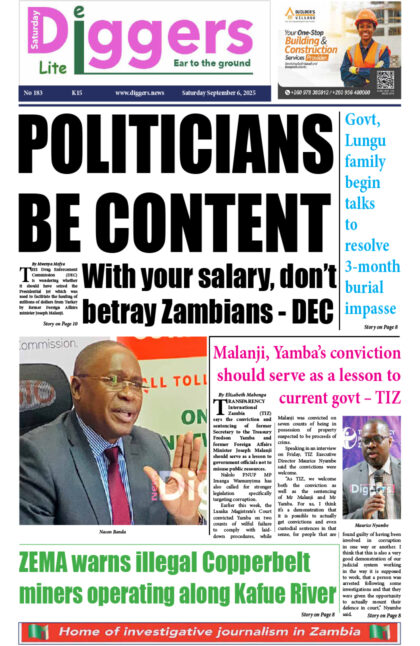THE Human Rights Commission has called on citizens to be vigilant against any early warning signs of dictatorial tendencies characterized by intimidation of individuals and suppression of human rights and fundamental freedoms.
In a statement, Thursday, HRC spokesperson Mweelwa Muleya said the commission had noted with concern the recent threats made by Lusaka Province Minister Bowman Lusambo against some artists which was against freedom of expression.
“The Human Rights Commission (HRC/Commission) has received numerous calls from both members of the public and the media regarding yesterday’s Press Briefing by the Minister of Lusaka Province, Bowman Lusambo, at which he allegedly threatened some individuals and artistes for expressing their opinions through recorded videos which were being circulated on various social media platforms. Following those calls, the Commission took time to review the said recorded videos by Mr Brian Bwembya, whose artiste name is B-Flow, Mr Kings Malembe Malembe and the Press Briefing by honourable Lusambo,” Muleya stated.
“Having reviewed the videos in question, it is the well-considered view of the Commission that the expressions contained in the videos were within the realm of the Right to Freedom of Expression as contained under article 20 of the Constitution of Zambia, Chapter 1 of the Laws of Zambia and various Regional and International Human Rights Instruments to which Zambia is a Party.The Commission did not also find anything injurious to the rights or reputation of the Presidency in the reviewed videos. Therefore, the lawful limitation of freedom of expression on account of defamation of the President does not arise.”
He stated that during his briefing, Lusambo used threatening words on the lives of innocent citizens, hence the need for citizens to be vigilant against early warnings of dictatorial tendencies.
“Further, the information expressed therein did not constitute any threat to public order, public morality or national security, which are stipulated international standards for restricting human rights, including freedom of expression. It would seem from the recorded videos that the objective of the involved individuals was to advise the President and also express themselves on governance matters, which is their constitutional and democratic right,” Muleya stated.
“The review of the press briefing video recording by the commission has found that it contained remarks that amounted to suppression of the fundamental right to freedom of expression as enshrined in the Constitution and various human rights instruments. Worse still, the language used was demeaning and derogatory. Further, the Commission received calls from individuals who expressed fear that the remark by the Minister that the castigated individuals were ‘too naked to misbehave….let them know their boundaries’, bordered on threats on their lives, which is deeply regrettable. Therefore, the Commission calls upon everyone to remain vigilant against any early warning signs of dictatorial tendencies characterized by intimidation of individuals and suppression of human rights and fundamental freedoms.”
Muleya said suppression of media freedom and freedom of expression were the main features of a dictatorship and must not be allowed to take root in Zambia.
“Suppression of media freedom and freedom of expression are the main features of a dictatorship and must not be allowed to take root in Zambia by condemning such acts whenever they are committed by anybody. The Commission also calls upon government leaders to adhere to the rule of law, constitutionalism and respect for human rights and refrain from over relying on common sense when dealing with national matters,” stated Muleya.
“Further, leaders are advised to use respectful language when engaging with individuals regardless of their status whether young, poor or vulnerable. Using threatening and disrespectful language against individuals by leaders amounts to abuse of authority and is incompatible with tenets of good governance and democracy.”
























